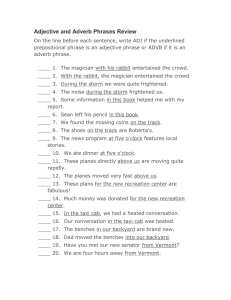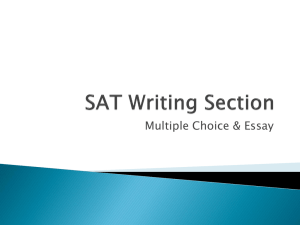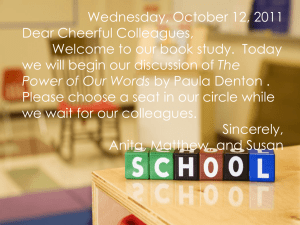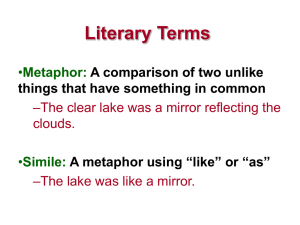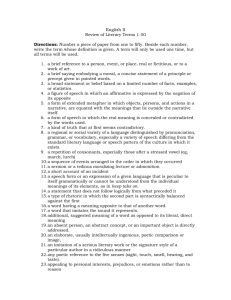Terms and Vocabulary
advertisement
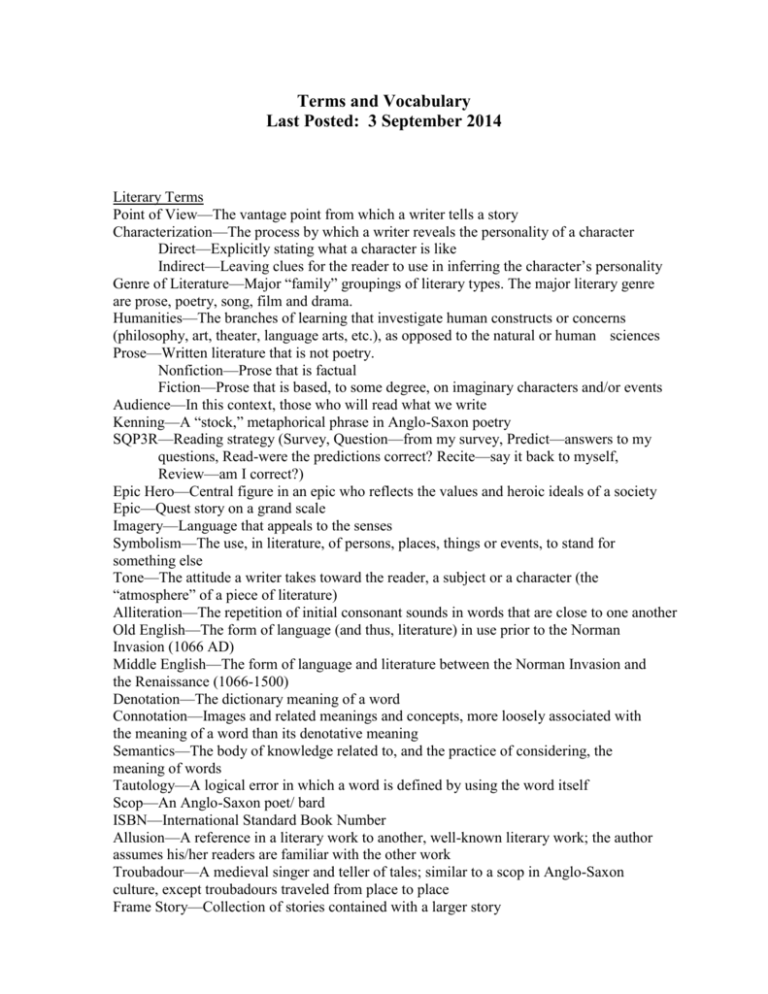
Terms and Vocabulary Last Posted: 3 September 2014 Literary Terms Point of View—The vantage point from which a writer tells a story Characterization—The process by which a writer reveals the personality of a character Direct—Explicitly stating what a character is like Indirect—Leaving clues for the reader to use in inferring the character’s personality Genre of Literature—Major “family” groupings of literary types. The major literary genre are prose, poetry, song, film and drama. Humanities—The branches of learning that investigate human constructs or concerns (philosophy, art, theater, language arts, etc.), as opposed to the natural or human sciences Prose—Written literature that is not poetry. Nonfiction—Prose that is factual Fiction—Prose that is based, to some degree, on imaginary characters and/or events Audience—In this context, those who will read what we write Kenning—A “stock,” metaphorical phrase in Anglo-Saxon poetry SQP3R—Reading strategy (Survey, Question—from my survey, Predict—answers to my questions, Read-were the predictions correct? Recite—say it back to myself, Review—am I correct?) Epic Hero—Central figure in an epic who reflects the values and heroic ideals of a society Epic—Quest story on a grand scale Imagery—Language that appeals to the senses Symbolism—The use, in literature, of persons, places, things or events, to stand for something else Tone—The attitude a writer takes toward the reader, a subject or a character (the “atmosphere” of a piece of literature) Alliteration—The repetition of initial consonant sounds in words that are close to one another Old English—The form of language (and thus, literature) in use prior to the Norman Invasion (1066 AD) Middle English—The form of language and literature between the Norman Invasion and the Renaissance (1066-1500) Denotation—The dictionary meaning of a word Connotation—Images and related meanings and concepts, more loosely associated with the meaning of a word than its denotative meaning Semantics—The body of knowledge related to, and the practice of considering, the meaning of words Tautology—A logical error in which a word is defined by using the word itself Scop—An Anglo-Saxon poet/ bard ISBN—International Standard Book Number Allusion—A reference in a literary work to another, well-known literary work; the author assumes his/her readers are familiar with the other work Troubadour—A medieval singer and teller of tales; similar to a scop in Anglo-Saxon culture, except troubadours traveled from place to place Frame Story—Collection of stories contained with a larger story Bob and Wheel—A medieval verse pattern that breaks a long narrative, consisting of a short line (“bob”), followed by four lines (two couplets—“wheel”) Romance—A narrative following the adventures of a hero on a quest, who faces supernatural obstacles and proves his character (refer to page 167) Irony—A strangely coincidental contrast between expectations and reality Verbal Irony—When a speaker says one thing and means another, or when the words spoken have a curiously coincidental and opposite meaning Situational Irony—A similar situation between what exists or happens and what is expected Open Couplet—A pair of lines in poetry that share ending rhyme but in which the sentence or thought in at least one of the lines extends beyond the line to another for its conclusion Voice—The sense of personality or authority that a writer conveys to the reader; the ability of the writer to create a unique and interesting image or personality for himself or herself in the mind of the reader Tone—The attitude the writer conveys regarding a character, an object or an event Epiphany—A sudden realization, enlightenment or understanding Grammar Terms—Refer to the grammar handbook that you tore-out and put into your notebooks. Clause Essential/ Nonessential Phrase Subject/Predicate Passive Voice Comma Splice Transitive Verb Run-On Intransitive Verb Compound Sentence Linking Verb Simple Sentence Prepositional Phrase Complex Sentence Verbal Phrase Parts of Speech (Noun, Pronoun, Verb, Adverb, Adjective, Participial Phrase Conjunction, Preposition, Interjection, Article) Infinitive Phrase Main Clause Gerund Phrase Subordinate Clause Absolute Phrase Adverb Clause Fragment Adjective Clause Direct Object Noun Clause Predicate Nominative Indirect Object Predicate Adjective All of the following--Refer to the “Five-Paragraph Essay Model” Diagram Thesis—A statement summarizing the writer’s conclusion about the topic Topic—The “narrowed-down” subject of the paper Topic Sentence—The first sentence in each body paragraph naming the topic of the paragraph Transition Device—A word or phrase in each of the topic sentences connecting the paragraph to what precedes it Supporting Sentence—The details in a body paragraph that support the topic sentence Clincher Sentence—The concluding sentence of each body paragraph, gives closure and hints at transition Echo of Thesis—A reference (not a restatement) of the thesis; the first sentence in a concluding paragraph Hook—A sentence creating a question or need in the reader’s mind, to be answered by the thesis Body Paragraph-(Refer to the Writing Process Diagram) Pre-Writing—The most creative step in the writing process Drafting—Producing the initial, complete composition Revision—Making large-scale changes in the paper (structure, content, etc.) Editing—The most critical (vs. creative) step in the writing process; looking for incorrect detail (small-scale changes) Publishing—Delivering your finished composition to its intended audience The following definitions apply within the context of the writing process only: *Creative—focusing on what might work—new ideas or possibilities *Critical—looking for what might be wrong or what needs to be improved Vocabulary Words/ Terms for the Poetry Test Evoke—to call forth (as with emotions or images). Ineffable—incapable of being expressed in words Catharsis—a purification or purging of the emotions Proposition(al)—a statement of fact representing itself as the truth Aesthetic—artistically oriented, related to a consideration of the aspects of beauty in a given object Articulate—(verb) to express in words Existentialism—A philosophical outlook that holds the existence of the individual to be the basic (or only) certainty; beyond that, the individual must construct his or her own meaning from an otherwise absurd universe Vicarious—experienced through second-hand participation Anthology—A collection of literary works Explication—A detailed explanation of a literary text Epigram—A brief poetic expression that memorializes or commemorates Macbeth Test Terms and Vocabulary Words Duplicity—the quality of being “two-faced” or deceptive about one’s true nature or intent Duality—A pair of opposites Equivocate—To “flip-flop,” or go back and forth in one’s speech between two opposites Apparition—An appearance, vision Thane—A Scottish Lord Heath—The Scottish countryside Lechery—Inordinate indulgence in sexual activity Tanistry—A Scottish law forbidding a king to pass the crown directly to a son Aside—A conversation or comment which some other actors on the stage do not appear to notice Soliloquy—A brief speech by a lone actor on the stage Malevolence—Ill-will or intent Benevolence—Goodwill or good intent Presupposition—What is assumed to be true before an argument begins Bias—A preference against a position based more upon feeling than logic or ethical argument Britons, Scots, Picts, Irish—Names of tribal groupings in British Isles during the AngloSaxon Period Paganism—A variety of religions that are polytheistic (worship more than one divine being, some of which are female) and that view nature as a manifestation of deity, itself (as opposed to nature being the creation of a divine being). Pagan religions also emphasize the role of fate in determining destiny and the use of omens in reading the future or in making decisions. The early Celts were pagan. Modern paganism may, or may not, be consistent with the forms practiced in the early Roman Empire. Animism—A form of religion that finds spirits in natural objects, even some that are, otherwise, inanimate, such as trees or rivers. Druidism—Druids were priests of the ancient Celts Worldview—The window by which each person views the world, and decides, often subconsciously, what is real/unreal or important/unimportant. A worldview answers three basic questions: (1) What is my own origin and the origin of the universe? (2) How do I account for adversity, evil and suffering? (3) How are things properly “put right,” or made the way they should be? Are things the way they should be? Also, what is the desired state or condition or outcome, or the desired outcome or goal, of human effort? Individuals within the same historical period or cultural group commonly share similar worldviews. Thus, we may speak of a “Celtic worldview,” an “Anglo-Saxon worldview, a “Renaissance worldview,” or an “Enlightenment worldview,” realizing that any given individual within these time periods and cultures may have held a slightly different one. Recursive—Repeats itself (an adjective); the writing process is recursive Mutually Exclusive—A situation in which two things do not have any overlap Inclusive—Includes other elements (an adjective) Resonate—In physical terms: To vibrate after an initial stimulus; As a figure of speech: To “strike a chord,” or to “stay with,” an audience. If something “resonates,” it evokes thoughtful attention and reflection. Universal—(An adjective) Applies to everyone Dignity—The quality or estate of being worthy, honored, esteemed Medieval Terminology Chivalry—Code of conduct for knights Tournament—Festival to display military skills of knights Joust/ Tilt—Tournament event in which two knight on horseback oppose each other with lances Page—First step in becoming a knight Squire—Second step in becoming a knight; assists knights in battle and at tournaments Knight Heraldry—Colorful display of coats-of-arms to identify knights at tournaments and on the battlefield Yeoman—Small, independent landowner, long-bowman Guild—Trade (work skill) organization, precursor of modern-day labor unions Courtly Love—Idealized, romantic love of knights for noble-women; the customs and courtesies of this, as seen in literature Additional Words Civility—Respecting the dignity of others in interaction; polite and courteous behavior; control or restraint of emotions Argument—A skillfully constructed appeal, or attempt, to persuade an audience to change its convictions regarding a particular issue Premise Logos—A persuasive appeal to logic Pathos—A persuasive appeal to emotions (specifically, the emotions of sympathy and pity) Ethos—A persuasive appeal to ethics Integrity—Moral soundness or wholeness, with particular emphasis on (complete) honesty or truthfulness Valor Emotivism Metanarrative Absolute--Fixed, unchanging, complete in itself Rhetoric—Persuasive discourse, skillfully delivered; the art of such Duplicity/ Duplicitous Relative/ Relativism—Changes depending upon circumstances, a belief system based upon the notion that truth is not absolute Critic/ Critical—One who analyzes something (as literature) and then makes an informed judgment about it Discern/ Discernment—The application of wisdom and knowledge to specific situations or issues Discriminate—To distinguish; an essential aspect of the human faculty of reason; not to be confused with “racial discrimination,” which connotes unfairly stereotyping all members of a particular racial or ethnic group Tolerance/ Tolerant—Dealing in a civil manner with, and respecting the personal dignity of, those with whom one disagrees Equivocate Nihilism—A (self-defeating) view of reality which holds that no ultimate meaning exists Naturalism Occult/ Occultism Perverse/ Perverted Noble/ Nobility Sensual/ Sensuality Humility/ Humble—The avoidance of undue or excessive personal pride or selfadulation; surrender of the demand for preferential treatment Redeem/ Redemption/ Redemptive Depravity/ Depraved Anarchy Despair—loss of hope Naïve/ Naiveté Coherence/ Coherent Rational/ Irrational/ Rationality Theism/ Monotheism Objective—As an adjective: To be based upon specific, stipulated criteria Subjective—As an adjective: To be based upon whim, feeling or intuition Modesty—Avoidance of vulgarity, baseness or “flaunting” of personal attributes, understatement of one’s strengths Secular/ Secularism Parley—An attempt to avoid confrontation; a conference among leaders of opposing sides (often conducted in the middle of the battlefield between opposing forces) as an attempt to avoid the impending clash Hubris—An arrogant projection of power or advantage Additional Persuasive Writing Terminology (Refer to Handout for Definitions) Evidence Logic Inductive Reasoning Deductive Reasoning Syllogism Satire *Target/Object/Point/Method Logical Fallacies Stereotyping False Analogy Loaded Words Overgeneralization Oversimplification Premise Arthurian Literature—Names and Places Lancelot Galahad Holy Grail/ Grail Quest Geoffrey of Monmouth Cretien de Troyes Sir Thomas Malory Joseph of Aramethea Glastonberry Cadbury Vortigren Uther Pendragon Alfred, Lord Tennyson T.H. Whyte Tintagel Castle Bedeviere Mordred Excalibur The Lady of Shalott Igrain, Duchess of Cornwall
